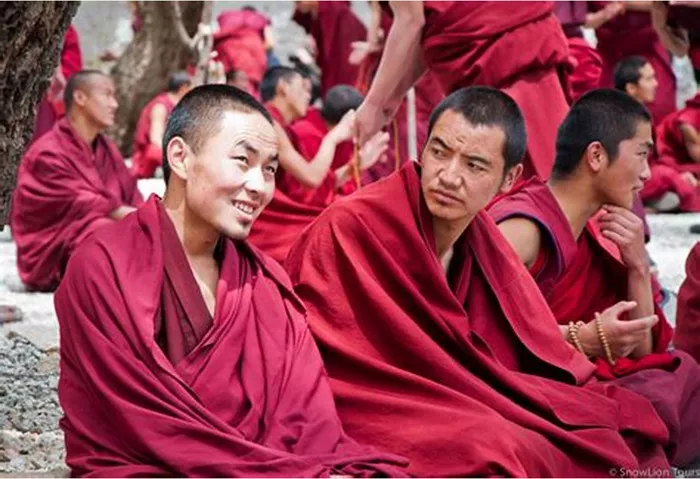Monks are people who live a special life, often dedicated to spiritual or religious goals. Most monks belong to a religion and follow strict rules about how to live. They usually live apart from regular society and spend time in meditation, prayer, and study. In Buddhism, monks are well known for their simple life and deep spiritual practice.
What Does Religion Mean to Monks?
Religion usually means following a set of beliefs about life, the world, and the meaning of existence. For many monks, religion is very important because it gives them a clear path to follow. They take vows and live in a community that supports their spiritual growth. But can someone be a monk without being religious? This is the main question we want to explore.
Understanding the Concept of Monks in Buddhism
Buddhist Monks and Their Role
Buddhist monks are known for following the teachings of the Buddha. They live by the Vinaya rules, which are strict guidelines about behavior, dress, and daily activities. Their goal is to reach enlightenment by practicing meditation, wisdom, and moral conduct.
In Buddhism, becoming a monk is a deep religious commitment. Monks often wear the buddhism monks outfit, a simple robe symbolizing their renunciation of worldly life.
The Buddhist Monk Lifestyle
The life of a Buddhist monk is simple and disciplined. They wake up early, meditate, chant, study scriptures, and live without possessions. This lifestyle supports their spiritual goals. You can learn more about the buddhist monk lifestyle and how they live.
Can There Be Non Religious Monks?
What Does “Non Religious Monk” Mean?
At first, the phrase “non religious monk” may seem strange. Monks, by definition, are usually religious. They dedicate themselves to spiritual or religious life. However, some people use the word “monk” for individuals who live like monks but do not follow a religion. They might focus on meditation, simplicity, or ethical living without belief in gods or scriptures.
Modern Examples of Non Religious Monks
In recent years, some people have adopted a monastic lifestyle without religion. They practice mindfulness, meditation, and live simply, like monks, but do not follow any particular faith. These individuals might call themselves “secular monks” or “modern monks.”
These modern monks focus on mental clarity, peace, and ethics rather than religious doctrines. Their life can look like a monk’s, but without rituals or religious ceremonies.
How Are Non Religious Monks Different from Traditional Monks?
- Belief System: Traditional monks follow religious teachings. Non religious monks do not.
- Vows: Religious monks take formal vows. Non religious monks may have personal commitments but not religious ones.
- Community: Religious monks live in monasteries. Non religious monks may live alone or in informal groups.
Buddhism and Non Religious Monks
Is Buddhism Itself Religious?
Buddhism is often called a religion, but it is also described as a philosophy or way of life. It does not require belief in a god, unlike many religions. This makes Buddhism more flexible. Some people follow Buddhist teachings without calling themselves religious.
Secular Buddhism and Monks
Secular Buddhism is a modern approach where people use Buddhist ideas for practical living and meditation. Some secular Buddhists live a monastic lifestyle without religious faith. They practice mindfulness and ethics but avoid rituals or supernatural beliefs.
Can Buddhist Monks Be Non Religious?
Strictly speaking, Buddhist monks are religious because they follow the Buddha’s path and take vows. But there are Buddhist practitioners who live like monks without full religious commitment. They might wear robes, meditate daily, and follow ethical precepts, yet not fully embrace the religious aspects.
Why Do Some People Choose a Non Religious Monastic Life?
Seeking Simplicity and Peace
Many are drawn to the monk lifestyle because it offers freedom from material worries. Simplicity can bring mental peace and focus. Some want to live ethically without being tied to religion.
Interest in Meditation and Mindfulness
Mindfulness and meditation have become popular worldwide. Some people adopt monk-like routines just to improve their mental health and focus.
Rejecting Organized Religion
Some people have doubts about organized religion but still respect the monastic way of life. They want spiritual practice without dogma or formal religious belief.
Examples of Monks Without Strong Religious Identity
Western Monastic Movements
In the West, there are communities inspired by Buddhist or Christian monasticism, but they focus on meditation, service, and simple living rather than religious doctrine.
Mindfulness Teachers and Modern Monks
Some well-known mindfulness teachers live a simple, monk-like life but identify as secular or non religious. They teach meditation and ethical living without religious labels.
Challenges and Criticisms
Authenticity of Non Religious Monks
Some traditional monks question if non religious monks can truly be called monks. They say that without religious vows and beliefs, the term loses its meaning.
Community and Support
Religious monks often have strong community support, which non religious monks may lack. Living alone or without structure can be difficult.
Conclusion
To answer the question: “Are there non religious monks?”—Yes, there are individuals who live a monk-like life without formal religious belief. However, in traditional terms, monks are usually religious. The modern world has created space for secular or non religious monks who practice simplicity, meditation, and ethics without religious faith.
Whether religious or not, the monk lifestyle offers valuable lessons about peace, focus, and ethical living. Understanding both traditional and non religious monks helps us appreciate the diversity of spiritual paths in today’s world.

